culture shock
Unit 2 Culture Shock

Stage One: Initial Euphoria /The Honeymoon
• Arrive with great expectations and positive mind set; • Anything new is intriguing, fascinating and exciting; • Focus on similarities and how people everywhere are really very much alike; • May last from a week or two to a month or more.
Love Peter
Dear Mum and Dad, I’m really feeling fed up with my life here and longing for home. Getting anything done over here is a nightmare --- the locals are so lazy and unhelpful. And on top of all that I feel rundown and sleepy all the time, seem to have lost all my zest. Love Jim
Symptoms of Culture Shock
• Sadness, loneliness, melancholy • Preoccupation with health • Aches, pains, and allergies • Insomnia, desire to sleep too much or too little • Changes in temperament, depression, feeling vulnerable, feeling powerless • Anger, irritability, resentment, unwillingness to interact with others • Identifying with the old culture or idealizing the old country • Loss of identity •Trying too hard to absorb everything in the new culture or country ; •Unable to solve simple problems ; •Lack of confidence •Feelings of inadequacy or insecurity •Developing stereotypes about the new culture •Developing obsessions such as overcleanliness •Longing for family Feelings of being lost, overlooked, exploited or abused
CultureShock中英对译及缩写

Culture shock英汉对译及原文缩写一、英汉对译Culture shock might be called an occupational disease of people who have been suddenly transplanted abroad. Like most ailments, it has its own symptoms and cure. 1.文化冲击又叫人们移居国外的职业病。
像大多数小病一样,它也有自己的症状与治疗方法。
Culture shock is precipitated by the anxiety that results from losing all our familiar signs and symbols of social intercourse. Those signs or cues include the thousand and one ways in which we orient ourselves to the situation of daily life: when to shake hands and what to say when we meet people, when and how to give tips, how to make purchases, when to accept and when to refuse invitations, when to take statements seriously and when not. These cues, which may be words, gestures, facial expressions, customs, or norms, are acquired by all of us in the course of growing up and are as much a part of our culture as the language we speak or the beliefs we accept. All of us depend for our peace of mind and our efficiency on hundreds of these cues, most of which we do not carry on the level of conscious awareness.2.文化冲击是焦虑产生的,这种焦虑是由于丧失了指导我们进行社交的熟悉的信号与符号。
九年级英语 Unit 2 Culture shock 重点词组词汇派生变化

16. manage to do 设法做到
17. under the weather 不得劲,略有不适
18. be different from 与……不同
19. require sb. to do sth. 要求某人做某事
20. wear school uniforms 穿校服
21. have great memories of 对…有美好回忆
22. dress as
打扮成……
23. think about 考虑,回想
24. a host family 寄宿家庭 25. an exchange student 交换生 26. a summer camp 夏令营 27. stay healthy 保持健康 28. experience Chinese culture 体验中国文化
9. give a speech 做演讲 10. be strange to 对……陌生 11. in my spare time 在某人空闲时间 12. miss home 想家 13. feel lonely 感到孤独 14. to a certain degree 在某种程度上 15. get used to 习惯于,适应
★ Meaning of the words and phrases
1. idiom----a group of words with a special meaning 2. rain cats and dogs----rain heavily 3. admit----agree unwillingly that something is true 4. international ----connected with two or more countries 5. schedule----a plan 6. why
牛津深圳版英语九下Unit2《Cultureshock》说课稿3

牛津深圳版英语九下Unit 2《Culture shock》说课稿3一. 教材分析牛津深圳版英语九下Unit 2《Culture shock》是一篇关于文化冲击的文章。
文章主要讲述了一个中国学生在美国留学时所遇到的文化差异和困难,以及他是如何逐渐适应和克服这些困难的。
通过这篇文章,学生可以了解到不同国家的文化差异,增强跨文化交际的能力,提高英语阅读和写作技能。
二. 学情分析九年级的学生已经具备了一定的英语基础,能够理解和运用一些基本的英语语法和词汇。
但是,他们在阅读和写作方面还存在一些困难,特别是在理解长篇阅读材料和写作技巧方面。
此外,学生可能对文化差异有一定的了解,但缺乏深入的认识和体验。
三. 说教学目标1.知识目标:学生能够理解并运用文章中的关键词汇和语法结构。
2.能力目标:学生能够阅读和理解长篇阅读材料,提高阅读能力;通过写作练习,提高写作技巧。
3.情感目标:学生能够认识到文化差异,增强跨文化交际的能力,培养尊重和理解不同文化的态度。
四. 说教学重难点1.重难点:文章中的关键词汇和语法结构的理解和运用。
2.原因:文章中涉及一些特定的词汇和语法结构,学生可能不熟悉,需要通过讲解和练习来掌握。
五. 说教学方法与手段1.教学方法:采用任务型教学法,让学生在实际的语言环境中学习和运用英语。
2.教学手段:使用多媒体教学设备,展示相关的文化图片和视频,帮助学生更好地理解和感受文化差异。
六. 说教学过程1.导入:通过展示一些文化差异的图片和视频,引起学生的兴趣和好奇心,引出本课的主题。
2.阅读理解:学生阅读文章,回答相关问题,理解文章的主要内容和观点。
3.词汇和语法讲解:讲解文章中的关键词汇和语法结构,让学生理解和掌握。
4.写作练习:学生根据文章的内容和所学知识,写一篇关于文化差异的短文。
5.小组讨论:学生分组讨论,分享自己的文化经历和感受,增强跨文化交际的能力。
6.总结:教师总结本课的主要内容和知识点,强调文化差异的重要性。
culture shock阅读理解
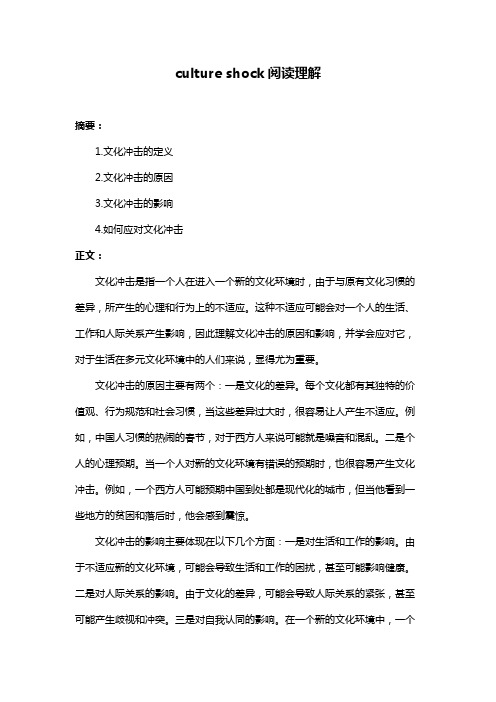
culture shock阅读理解摘要:1.文化冲击的定义2.文化冲击的原因3.文化冲击的影响4.如何应对文化冲击正文:文化冲击是指一个人在进入一个新的文化环境时,由于与原有文化习惯的差异,所产生的心理和行为上的不适应。
这种不适应可能会对一个人的生活、工作和人际关系产生影响,因此理解文化冲击的原因和影响,并学会应对它,对于生活在多元文化环境中的人们来说,显得尤为重要。
文化冲击的原因主要有两个:一是文化的差异。
每个文化都有其独特的价值观、行为规范和社会习惯,当这些差异过大时,很容易让人产生不适应。
例如,中国人习惯的热闹的春节,对于西方人来说可能就是噪音和混乱。
二是个人的心理预期。
当一个人对新的文化环境有错误的预期时,也很容易产生文化冲击。
例如,一个西方人可能预期中国到处都是现代化的城市,但当他看到一些地方的贫困和落后时,他会感到震惊。
文化冲击的影响主要体现在以下几个方面:一是对生活和工作的影响。
由于不适应新的文化环境,可能会导致生活和工作的困扰,甚至可能影响健康。
二是对人际关系的影响。
由于文化的差异,可能会导致人际关系的紧张,甚至可能产生歧视和冲突。
三是对自我认同的影响。
在一个新的文化环境中,一个人可能会对自己的文化身份产生质疑,这可能会对他的自我认同产生影响。
那么,如何应对文化冲击呢?首先,我们需要理解并接受文化差异。
每个文化都有其存在的理由,我们应尊重并理解它们。
其次,我们需要调整我们的心理预期。
我们应以开放的心态去接受新的文化环境,而不是抱有过高的期待。
最后,我们需要积极地融入新的文化环境。
只有通过积极的互动和交流,我们才能更好地适应新的文化环境。
cultureshock听力原文talk
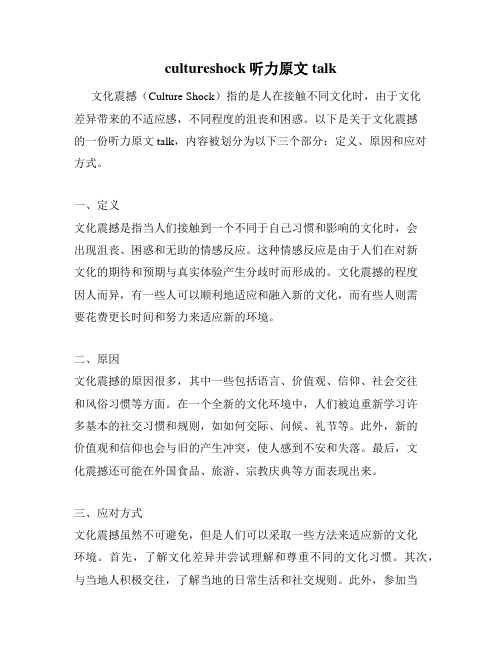
cultureshock听力原文talk
文化震撼(Culture Shock)指的是人在接触不同文化时,由于文化
差异带来的不适应感,不同程度的沮丧和困惑。
以下是关于文化震撼
的一份听力原文talk,内容被划分为以下三个部分:定义、原因和应对方式。
一、定义
文化震撼是指当人们接触到一个不同于自己习惯和影响的文化时,会
出现沮丧、困惑和无助的情感反应。
这种情感反应是由于人们在对新
文化的期待和预期与真实体验产生分歧时而形成的。
文化震撼的程度
因人而异,有一些人可以顺利地适应和融入新的文化,而有些人则需
要花费更长时间和努力来适应新的环境。
二、原因
文化震撼的原因很多,其中一些包括语言、价值观、信仰、社会交往
和风俗习惯等方面。
在一个全新的文化环境中,人们被迫重新学习许
多基本的社交习惯和规则,如如何交际、问候、礼节等。
此外,新的
价值观和信仰也会与旧的产生冲突,使人感到不安和失落。
最后,文
化震撼还可能在外国食品、旅游、宗教庆典等方面表现出来。
三、应对方式
文化震撼虽然不可避免,但是人们可以采取一些方法来适应新的文化
环境。
首先,了解文化差异并尝试理解和尊重不同的文化习惯。
其次,与当地人积极交往,了解当地的日常生活和社交规则。
此外,参加当
地的文化活动和社交活动可以帮助人们适应新的环境。
最后,在适应新环境的同时,保留自己的身份和文化特色也很重要。
总之,文化震撼是一个全球现象,每个人都可能遭受。
但是,采取适当的方法和思考方式可以帮助人们克服文化差异带来的挑战,逐渐适应新的文化环境。
Unit2_Culture_Shock_1文化冲击解析

Hospitality
What’s the problem?
The Chinese student felt disappointed at British hospitality because she used the Chinese way of showing hospitality to judge the British one. If the story taking place in China, the westerner couldn't imagine that there should be sixteen dishes prepared for her. When she ate from the eight cold dishes, she couldn't eat anymore. It is because a Western meal normally severs one main course plus a starter and sweets or desserts. The fact is that different people in the world show their different hospitality in different ways.
ቤተ መጻሕፍቲ ባይዱ
Politeness
Politeness refers to the consideration for others, tact, and observance of accepted social usage. 礼貌指的是为他人着 想、老练、遵守被 接受的社会规范。
Politeness
Some Chinese Students’ Views on Western Politeness: Foreigners never pretend to be modest. They just tell others what they think. If a Chinese person is faced with the same situation, maybe he or she would say, “ I'm sorry. The restaurant is a little bit small and the dishes are just so-so, but I hope you'll enjoy yourself.” When guests are to leave, the foreign hosts don't accompany guests to the gate upon leaving-taking. This happens because the foreigners are simply following their own cultural customs. If a Chinese host does like this, he will be considered a person with bad manners or no training and education.
Unit2_Culture_Shock_1文化冲击

Case studies
The Key to the Question: Guests to a Chinese family will never be allowed to do any housework. This is one of the ways the host and hostess show their hospitality. Even if the guests offer to cook a dish, the host or the hostess should stay around them and offer help whenever can. It is even harder to imagine that they would let their guests clear the table and do the dishes, though the guests should always volunteer help. Shao Bin’s meal at a British family sets a great contrast to her Chinese experience. This is why Shao Bin got angry. What she should do is to avoid a hasty conclusion. She should first observe the situation without judgment. And then analyze the situation using what she knows about the differences between Chinese and British culture.
CultureShock(翻译)
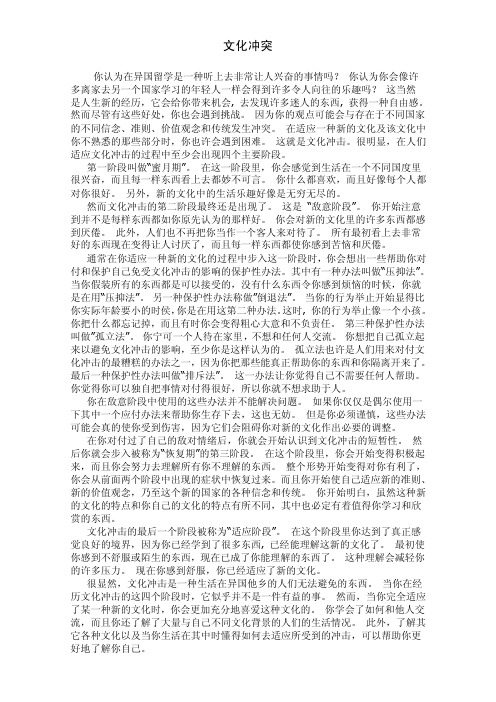
文化冲突你认为在异国留学是一种听上去非常让人兴奋的事情吗?你认为你会像许多离家去另一个国家学习的年轻人一样会得到许多令人向往的乐趣吗?这当然是人生新的经历,它会给你带来机会, 去发现许多迷人的东西, 获得一种自由感。
然而尽管有这些好处,你也会遇到挑战。
因为你的观点可能会与存在于不同国家的不同信念、准则、价值观念和传统发生冲突。
在适应一种新的文化及该文化中你不熟悉的那些部分时,你也许会遇到困难。
这就是文化冲击。
很明显,在人们适应文化冲击的过程中至少会出现四个主要阶段。
第一阶段叫做“蜜月期”。
在这一阶段里,你会感觉到生活在一个不同国度里很兴奋,而且每一样东西看上去都妙不可言。
你什么都喜欢,而且好像每个人都对你很好。
另外,新的文化中的生活乐趣好像是无穷无尽的。
然而文化冲击的第二阶段最终还是出现了。
这是“敌意阶段”。
你开始注意到并不是每样东西都如你原先认为的那样好。
你会对新的文化里的许多东西都感到厌倦。
此外,人们也不再把你当作一个客人来对待了。
所有最初看上去非常好的东西现在变得让人讨厌了,而且每一样东西都使你感到苦恼和厌倦。
通常在你适应一种新的文化的过程中步入这一阶段时,你会想出一些帮助你对付和保护自己免受文化冲击的影响的保护性办法。
其中有一种办法叫做“压抑法”。
当你假装所有的东西都是可以接受的,没有什么东西令你感到烦恼的时候,你就是在用“压抑法”。
另一种保护性办法称做”倒退法”。
当你的行为举止开始显得比你实际年龄要小的时侯,你是在用这第二种办法。
这时, 你的行为举止像一个小孩。
你把什么都忘记掉,而且有时你会变得粗心大意和不负责任。
第三种保护性办法叫做”孤立法”。
你宁可一个人待在家里,不想和任何人交流。
你想把自己孤立起来以避免文化冲击的影响,至少你是这样认为的。
孤立法也许是人们用来对付文化冲击的最糟糕的办法之一,因为你把那些能真正帮助你的东西和你隔离开来了。
最后一种保护性办法叫做“排斥法”。
这一办法让你觉得自己不需要任何人帮助。
文化休克名词解释题

文化休克名词解释题一、定义文化休克(Culture Shock)是指个体或群体在进入一个新的文化环境时,由于无法适应新的文化习俗、价值观、行为方式等,而产生的心理和生理上的不适应、困惑、焦虑、恐惧等负面情绪和反应。
二、原因文化休克的原因主要在于个体或群体在面对新的文化环境时,缺乏必要的心理准备和适应能力。
这可能是由于缺乏对目标文化的了解和认识,或者是因为原有的文化价值观和行为方式与目标文化存在较大的差异。
三、症状文化休克的症状可能因人而异,但通常包括以下几个方面:情绪波动、易怒、抑郁、焦虑、孤独感、失落感、思乡等。
在生理上,可能会出现失眠、食欲不振、疲劳等症状。
四、影响文化休克可能会对个体或群体的身心健康产生负面影响,降低生活和工作效率。
如果不能及时适应新的文化环境,还可能导致人际关系的紧张和冲突,影响跨文化交流和合作。
五、应对方法应对文化休克的方法包括以下几个方面:1.保持积极心态:认识到文化休克是一种正常现象,保持积极心态是应对的关键。
2.学习目标文化:了解和认识目标文化的价值观、习俗、行为方式等,有助于更好地适应新的环境。
3.寻求支持:与家人、朋友或同事保持联系,寻求支持和帮助。
参加文化交流活动,结交新朋友。
4.放松身心:学会放松身心的方法,如冥想、瑜伽等,有助于缓解焦虑和压力。
5.寻求专业帮助:如果症状严重,可以寻求心理咨询或治疗。
六、预防措施预防文化休克的方法包括以下几个方面:1.提前了解目标文化:在前往新的文化环境之前,提前了解目标文化的习俗、价值观、行为方式等,做好心理准备。
2.提高适应能力:通过学习和实践,提高个体或群体的适应能力。
这包括学习语言、了解当地文化习俗、提高沟通技巧等。
3.保持积极心态:在面对新的文化环境时,保持积极心态,不轻易放弃和抱怨。
学会欣赏和尊重目标文化的特点。
4.寻求帮助和支持:在遇到困难时,及时寻求帮助和支持。
与当地人交流,了解当地的文化和生活方式。
七、文化适应过程文化适应过程是指个体或群体在面对新的文化环境时,逐渐适应和融入的过程。
文化休克 名词解释汉硕

文化休克名词解释汉硕
“文化休克”(Cultural Shock)这一概念最早由美国人类学家奥伯格(Kalvero Oberg)于 1960 年提出,是指一个人进入到不熟悉的文化环境时,由于失去自己熟悉的所有社会交流的符号与手段而产生的一种迷失、疑惑、排斥甚至恐惧的感觉。
文化休克现象大多出现在旅居他乡、移民海外、出国留学等跨文化交际的情境中,也可能出现在一个社会急剧变化时期,如从农业社会变为工业社会或从传统社会变为现代社会等。
在跨文化交际中,由于文化差异,人们在语言、行为、生活方式、价值观念等方面会遇到各种困惑和不适,从而产生文化休克。
例如,一个中国学生到美国留学,可能会发现美国人的交往方式、饮食习惯、教育方式等与自己在中国的经历完全不同,从而感到困惑和不适应。
文化休克是一种正常的心理反应,它通常会经历四个阶段:兴奋期、沮丧期、调整期和适应期。
在兴奋期,人们对新文化充满好奇和兴奋,但随着时间的推移,可能会出现沮丧和失落的情绪,这是因为他们发现自己无法适应新文化。
在调整期,人们开始尝试适应新文化,并逐渐接受新文化的价值观和行为方式。
最后,在适应期,人们已经完全适应了新文化,并且能够自如地与新文化中的人交往。
为了减轻文化休克的影响,人们可以提前了解目标文化的背景和习俗,学习目标语言,积极参与当地的社交活动,与当地人交流,保持开放的心态和积极的态度,以及寻求支持和帮助。
趣味英语听力:Culture_Shock

Track 4趣味英语听力◎高 洁Culture ShockCulture shock is the emotional and mental reaction to being in a completely new cultural environment. This is often a very difficult 1 for many people and it consists of several stages of feelings until people successfully adapt to being in the new culture.The honeymoon stage of culture shock is usually the first stage that people 2 when surrounded by different cultural values and lifestyles. During this stage, people often have very positive images of their new cultural surroundings. They tend to 3 these in an 1)idealistic way and ignore or minimize problems. This stage quickly gives way to the second stage, called the 2)frustration stage.During the frustration stage, newcomers begin to experience a more 4 view of their cultural surroundings. There is a definite frustration that things that should be easy are still difficult. For example, people who may have been enjoying learning the basics of a language during the honeymoon stage would now find it a chore to try and 5 locals in the frustration stage.After the frustration stage ends, the adjustment stage begins. This marks the time when newcomers begin to adjust 6 to the new culture. They begin to accept the differences betweenSpotlight 20Crazy English /聚光灯Copyright ©博看网. All Rights Reserved.them and the challenges of everyday life. This opens the door to two possible outcomes— 3)mastery and rejection.Those newcomers who enter the mastery stage have completely Those who choose the rejection stage have decided not to accept it. They usually choose to 4)permanently withdraw from the culture through isolation or returning home.Culture shock is a very emotional experience for most people and there are many symptoms. It is important to recognize these symptoms in newcomers and 8 the reasons for these feelings.词组加油站1. consist of 表示“包含;由……组成”。
跨文化商务交际chapter_5_culture_shock
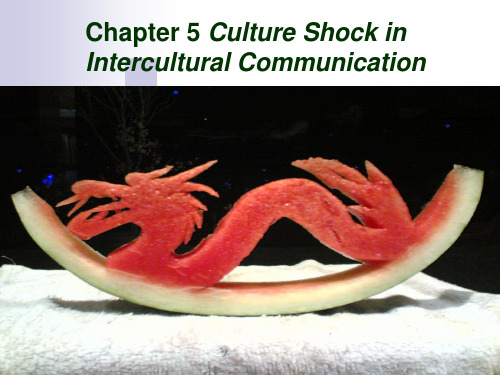
3.1 Two aspects of culture shock 3.2 Symptoms of culture shock in a new place 3.3 Symptoms of reverse culture shock
4. Curing culture shock
The term, culture shock, was introduced to describe the anxiety produced when a person moves to a completely new environment, esp. when a person arrives in a new country where he is confronted with a new cultural environment. This term expresses the lack of direction, the feeling of not knowing what to do or how to do things in a new environment, and not knowing what is appropriate or inappropriate. This feeling of culture shock generally sets in after the first few weeks of coming to a new place.
4.1 Defense mechanisms against culture shock 4.2 Alleviating culture shock
5. High-context and low-context cultures
跨文化商务交际chapter_5_culture_shock

Familiar signs and symbols are lost. Familiar cues are removed. All cultures are not exactly the same.
For example, American culture may be more straightforward in manner and rules of behavior, but Asian cultures are more ambiguous, or relate more to individual situations and cannot be easily understood by or explained to those born outside their culture.
本章主要从以下几个方面介绍文化 休克现象:文化休克的五个阶段、 文化休克症状、减轻文化休克的办 法以及高语境与低语境。
Contents
1. Feeling of culture shock 2. Stages of culture shock
2.1 The honeymoon stage 2.2 The hostility stage 2.3 The recovery stage 2.4 The adjustment stage 2.5 The biculturality stage
and beliefs and traditions of the new country Making some friends Be able to manage the size and complexity of the
environment Easy to get along with other people
九年级下册Unit 2 Culture shock 词汇

九年级下册Unit 2 Culture shock词汇1.culture shock文化冲击,文化休克原意是指一个人从其固有的文化环境中移居到一个新的文化环境中所产生的文化上的不适应。
二战后,随着人口的大量流动,产生了大批的移民,他们从一个国家移居到一个新的国家,从一种文化背景移居到新的文化背景,等待他们的是诸多跨文化的社会心理问题,文化冲击这个词就应运而生了。
文化冲击可以是多方面的,从气候、饮食、语言、服饰,直至行为举止、人口密度、政治经济环境,等等;既有身体的因素,更多的是精神因素。
在一个崭新的文化环境中,文化冲击使得受冲击者无所适从,甚至整个的心理平衡和价值判断标准完全丧失。
文化冲击的表现是:沮丧,抑郁,困惑,焦虑,孤独。
The movie observes the culture shock felt by two young employees.电影观察了两位年轻雇员感受到的文化冲击。
Most people feel culture shock when traveling to a foreign culture.去海外旅行时,许多人会感觉到不同文化的冲击。
2.camp n.度假营v.野营,露营A ten-year-old boy went to a summer camp for two months.The Browns camped at a hill last week.3.firework n.烟火,烟花The firework went off with a bang.爆竹砰的一声炸开了。
4.turkey火鸡The main dish is traditionally a turkey.5.international adj.国际的The number of international students is 7,705.That is why the international lessons are worth taking seriously.这就是为什么国际性的教训是值得仔细思考的。
qiu U2 Culture Shock
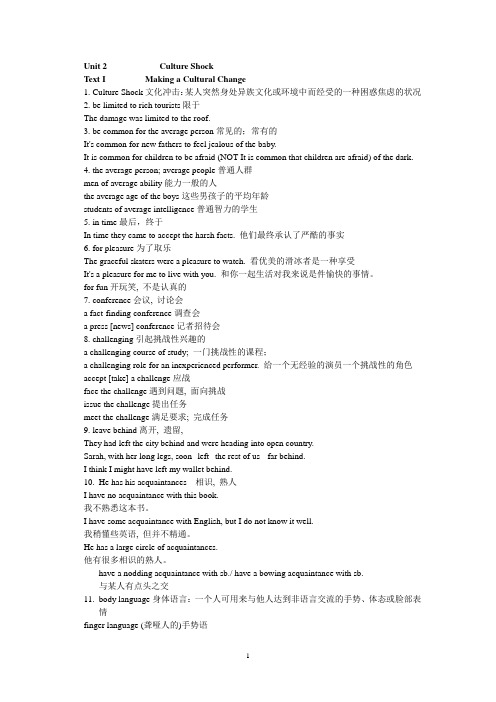
Unit 2 Culture ShockText I Making a Cultural Change1.Culture Shock文化冲击:某人突然身处异族文化或环境中而经受的一种困惑焦虑的状况2.be limited to rich tourists限于The damage was limited to the roof.3.be common for the average person常见的;常有的It's common for new fathers to feel jealous of the baby.It is common for children to be afraid (NOT It is common that children are afraid) of the dark.4.the average person; average people普通人群men of average ability能力一般的人the average age of the boys这些男孩子的平均年龄students of average intelligence普通智力的学生5.in time最后,终于In time they came to accept the harsh facts. 他们最终承认了严酷的事实6.for pleasure为了取乐The graceful skaters were a pleasure to watch. 看优美的滑冰者是一种享受It's a pleasure for me to live with you. 和你一起生活对我来说是件愉快的事情。
for fun开玩笑, 不是认真的7.conference会议, 讨论会a fact-finding conference调查会a press [news] conference记者招待会8.challenging引起挑战性兴趣的a challenging course of study; 一门挑战性的课程;a challenging role for an inexperienced performer. 给一个无经验的演员一个挑战性的角色accept [take] a challenge应战face the challenge遇到问题, 面向挑战issue the challenge提出任务meet the challenge满足要求; 完成任务9.leave behind离开, 遗留,They had left the city behind and were heading into open country.Sarah, with her long legs, soon left the rest of us far behind.I think I might have left my wallet behind.10.He has his acquaintances 相识, 熟人I have no acquaintance with this book.我不熟悉这本书。
culture shock阅读理解

culture shock阅读理解
摘要:
1.文化冲击的定义和背景
2.文化冲击的表现形式
3.如何应对文化冲击
4.文化冲击对我们的影响和启示
正文:
文化冲击是指在一个新的文化环境中,人们由于不熟悉当地的风俗习惯、价值观和行为规范,而产生的一种困惑、紧张和焦虑的心理状态。
随着全球化的加速推进,越来越多的人需要面对文化冲击。
本文将分析文化冲击的表现形式,探讨如何应对文化冲击,并思考文化冲击对我们的影响和启示。
文化冲击的表现形式有很多,比如在饮食方面,不习惯当地的食物可能会让人食欲不振;在社交方面,不理解当地人的沟通方式可能导致误解和冲突;在生活方面,不适应当地的居住条件和基础设施可能会影响生活质量。
此外,文化冲击还可能表现为对当地文化和价值观的不认同,从而产生心理压力。
要应对文化冲击,首先需要保持开放的心态,尊重当地的文化和习俗。
我们应该尽量了解当地的文化背景,学会换位思考,理解当地人的行为动机。
其次,要积极参与当地的社交活动,结交新朋友,增加与当地人的互动,从而提高自己的社交能力。
此外,我们还应该学会调整自己的期望值,避免将本国的生活方式和价值观强加于新的文化环境中。
文化冲击对我们的影响和启示是多方面的。
首先,文化冲击使我们认识到
世界文化的多样性,从而培养我们尊重和包容不同文化的品质。
其次,文化冲击锻炼了我们的适应能力,使我们能够在不同的文化环境中迅速找到生存之道。
最后,文化冲击使我们更加珍惜本国的文化传统,激发我们传承和弘扬民族文化的精神。
总之,文化冲击是全球化时代不可避免的现象。
牛津深圳版英语九下Unit 2《Culture shock》教学设计3
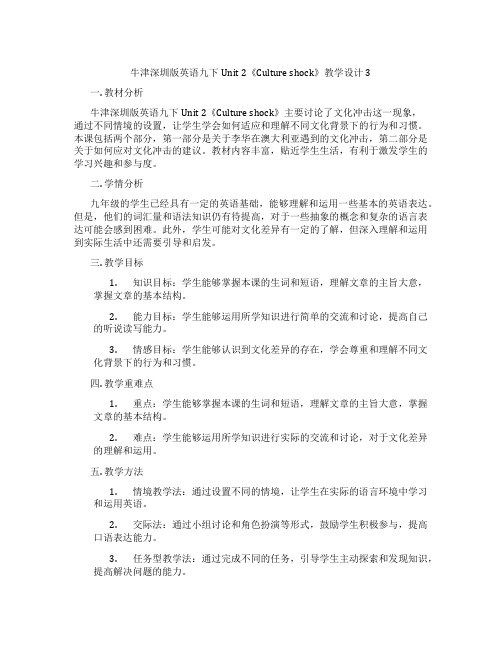
牛津深圳版英语九下Unit 2《Culture shock》教学设计3一. 教材分析牛津深圳版英语九下Unit 2《Culture shock》主要讨论了文化冲击这一现象,通过不同情境的设置,让学生学会如何适应和理解不同文化背景下的行为和习惯。
本课包括两个部分,第一部分是关于李华在澳大利亚遇到的文化冲击,第二部分是关于如何应对文化冲击的建议。
教材内容丰富,贴近学生生活,有利于激发学生的学习兴趣和参与度。
二. 学情分析九年级的学生已经具有一定的英语基础,能够理解和运用一些基本的英语表达。
但是,他们的词汇量和语法知识仍有待提高,对于一些抽象的概念和复杂的语言表达可能会感到困难。
此外,学生可能对文化差异有一定的了解,但深入理解和运用到实际生活中还需要引导和启发。
三. 教学目标1.知识目标:学生能够掌握本课的生词和短语,理解文章的主旨大意,掌握文章的基本结构。
2.能力目标:学生能够运用所学知识进行简单的交流和讨论,提高自己的听说读写能力。
3.情感目标:学生能够认识到文化差异的存在,学会尊重和理解不同文化背景下的行为和习惯。
四. 教学重难点1.重点:学生能够掌握本课的生词和短语,理解文章的主旨大意,掌握文章的基本结构。
2.难点:学生能够运用所学知识进行实际的交流和讨论,对于文化差异的理解和运用。
五. 教学方法1.情境教学法:通过设置不同的情境,让学生在实际的语言环境中学习和运用英语。
2.交际法:通过小组讨论和角色扮演等形式,鼓励学生积极参与,提高口语表达能力。
3.任务型教学法:通过完成不同的任务,引导学生主动探索和发现知识,提高解决问题的能力。
六. 教学准备1.教师准备:备好课件和教学材料,提前布置预习任务,了解学生的学习情况。
2.学生准备:预习本课内容,完成相关的预习任务。
七. 教学过程1.导入(5分钟)通过提问方式引导学生回顾上节课的内容,询问学生是否曾经遇到过文化冲击,激发学生的学习兴趣和参与度。
2.呈现(10分钟)教师通过课件呈现本课的主要内容,引导学生关注文章的主旨大意和基本结构。
牛津深圳版英语九下Unit 2《Culture shock》教学设计1

牛津深圳版英语九下Unit 2《Culture shock》教学设计1一. 教材分析牛津深圳版英语九下Unit 2《Culture shock》主要讨论了文化冲击这个主题。
本节课通过引入两个故事,让学生了解不同文化背景下人们的生活习惯和思维方式的差异,以及如何应对文化冲击。
教材内容丰富,插图生动,有利于激发学生的学习兴趣和参与度。
二. 学情分析九年级的学生已经具备一定的英语基础,对于日常交流和表达自己的观点没有问题。
但是,他们的阅读理解能力、写作能力和文化背景知识还有待提高。
此外,学生可能对文化差异有一定的了解,但缺乏深入的认识。
因此,在教学过程中,需要关注学生的兴趣,激发他们的学习热情,引导他们深入思考文化差异。
三. 教学目标1.知识目标:学生能够掌握与文化冲击相关的词汇和表达方式,理解文章的主旨和观点。
2.能力目标:学生能够运用所学知识,描述和分析文化差异,提高阅读理解和写作能力。
3.情感目标:学生能够尊重和理解不同文化,学会包容和接纳。
四. 教学重难点1.重点:学生能够理解文章的主旨和观点,运用相关词汇和表达方式进行交流。
2.难点:学生能够分析文化差异,提高阅读理解和写作能力。
五. 教学方法1.情境教学法:通过引入故事情境,让学生身临其境,提高学习兴趣和参与度。
2.互动教学法:引导学生进行小组讨论和分享,培养合作意识和沟通能力。
3.任务型教学法:设计具有挑战性的任务,让学生在完成任务的过程中,提高语言运用能力。
六. 教学准备1.教师准备:熟悉教材内容,了解学生的学习情况,设计教学活动和任务。
2.学生准备:预习相关词汇和表达方式,了解文化冲击的基本概念。
七. 教学过程1.导入(5分钟)教师通过展示图片或视频,引入文化冲击的主题,激发学生的兴趣。
提问:“你们听说过文化冲击吗?请分享一下你们的经历。
”2.呈现(10分钟)教师快速阅读文章,引导学生关注关键词汇和表达方式。
然后,学生自主阅读文章,理解文章主旨和观点。
英语作文culture shock

英语作文culture shock(中英文实用版)English:Culture shock is an inevitable experience for those who venture into the unknown realms of a different culture.It"s like a rollercoaster ride, filled with ups and downs, as one tries to navigate through the labyrinth of unfamiliar customs, traditions, and social norms.From the moment I stepped into the bustling streets of Tokyo, I was overwhelmed by the vibrant fusion of ancient rituals and futuristic technology.The politeness and formality in interactions took me by surprise, a stark contrast to the casual informality back home.Yet, amidst the chaos of cultural differences, lies the beauty of adaptation and growth, a journey that shapes one"s perspective and broadens their horizons.中文:文化冲击对于那些勇敢踏入不同文化领域的人来说是一种无法避免的经历。
这就像是一场过山车之旅,充满了起伏,因为一个人试图穿越充满陌生习俗、传统和社会规范的迷宫。
- 1、下载文档前请自行甄别文档内容的完整性,平台不提供额外的编辑、内容补充、找答案等附加服务。
- 2、"仅部分预览"的文档,不可在线预览部分如存在完整性等问题,可反馈申请退款(可完整预览的文档不适用该条件!)。
- 3、如文档侵犯您的权益,请联系客服反馈,我们会尽快为您处理(人工客服工作时间:9:00-18:30)。
● The differences between cultures can make it very difficult to adjust to the new surroundings. You may encounter unfamiliar clothes, weather, and food as well as different people, schools, and values. You may find yourself struggling to do things in your new surroundings that were easy back home. Dealing with the differences can be very unsettling; those feelings are part adjusting to a new culture.
Culture shock
Whatever method you choose, practice is really important. A lot of people are worried about speaking a language they aren‘t completely comfortable with and think that people who speak the language well will tease them when they stumble over words.
problem solving
queuing mode
What Causes Culture Shock?
Culture shock
● To
understand culture shock, it helps to understand what culture is. You may know that genes determine a big part of how you look and act. What you might not know is that your environment — your surroundings — has a big effect on your appearance and behavior as well.
What Causes Culture Shock?
Culture shock
● Your
environment isn't just the air you breathe and the food you eat, though; a big part of your environment is culture. Culture is made up of the common things that members of a community learn from family, friends, media, literature, and even strangers. These are the things that influence how they look, act, and
communicate. Often, you don't even know you're learning these things because they become second-nature to you — for instance, the way you shake hands with someone when meeting them, when you eat your meals each day, the kind of things you find funny, or how you view religion.
Knowing What to Expect
Culture shock
School is a great place to do this. Watch and learn from the people around you — see how the students interact with teachers and each other. Find out what your classmates do for fun and what kinds of things are important to them.
Coping With Teasing
Culture shock
As much as you would hate to be boxed into a certain type, try and get away from doing the same to others. These characterizations are just as unfair as the ones people might use to describe you. And beliefs in these can get in the way of making some good friends.
daily drinks
eating habits
shower time
Differences
Culture shock
punctuality
opinion expression
tourism equipment
vehicle
Differences
Culture shock
party
interpersonal relationship
do or how to do things in a new environment, and not knowing what is appropriate or inappropriate. The feeling of culture shock generally sets in after the first few weeks of coming to a new place.
Culture Shock
By 李程涛 俞晓波
What is culture shock???
Culture shock
The term, culture shock, was introduced for the first time in 1958 to describe the anxiety produced when a person moves to a completely new environment. This term expresses the lack of direction, the feeling of not knowing what to
Culture shock
Though people experience culture shock in different ways, these feelings are common:
•not wanting to be around people who are different from you •sadness •loneliness •anxiety •trouble concentrating •feeling left out or misunderstood •developing negative and simplistic views of the new culture •frustration •extreme homesickness
Culture shock
※ So
how do you deal with the frustration and fears you may be having?
※ How
Hale Waihona Puke can you begin to feel comfortable in your new surroundings?
Learning the Language
What Causes Culture Shock?
Culture shock
● When you go to a new
place, such as a new country or even a new city, you often enter a culture that is different from the one you left. Sometimes your culture and the new culture are similar. Other times, they can be very different, and even contradictory. What might be perfectly normal in one culture — for instance, spending hours eating a meal with your family — might be unusual in a culture that values a more fastpaced lifestyle.
This might tempt you to practice the language with someone who is at the same comfort level as you, but it’s also important to practice with people who have mastered the language, so that you know when you make a mistake and learn from it .
Your Family
It's important to realize that some people have an easier time adjusting to a new culture than others. Sometimes, if members in your family are having an easy transition, they'll be a great source of support — a group of people who are going through something very much like what you're going through. In addition, your family can be a big part of keeping ties to home.
